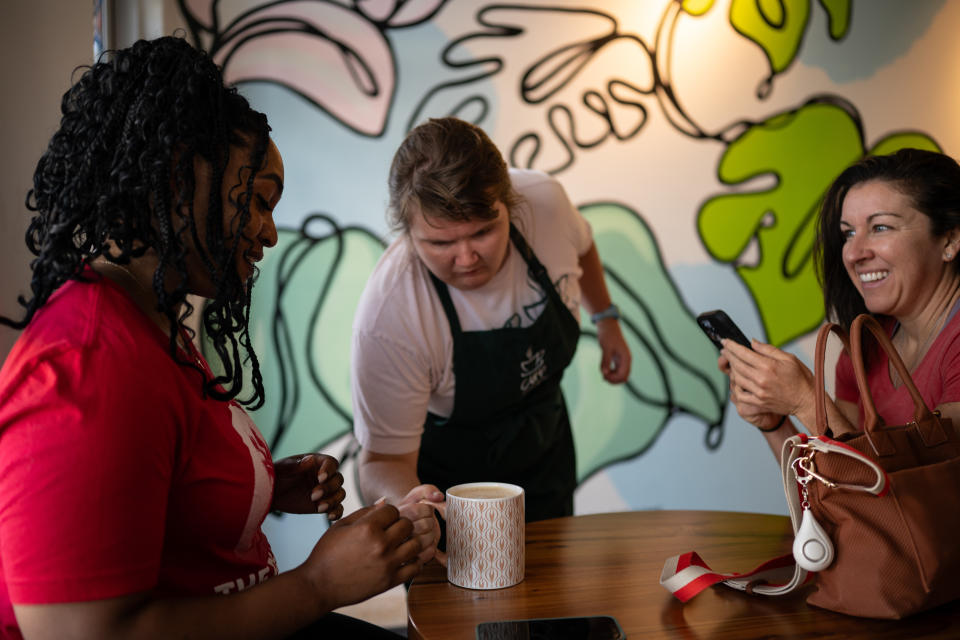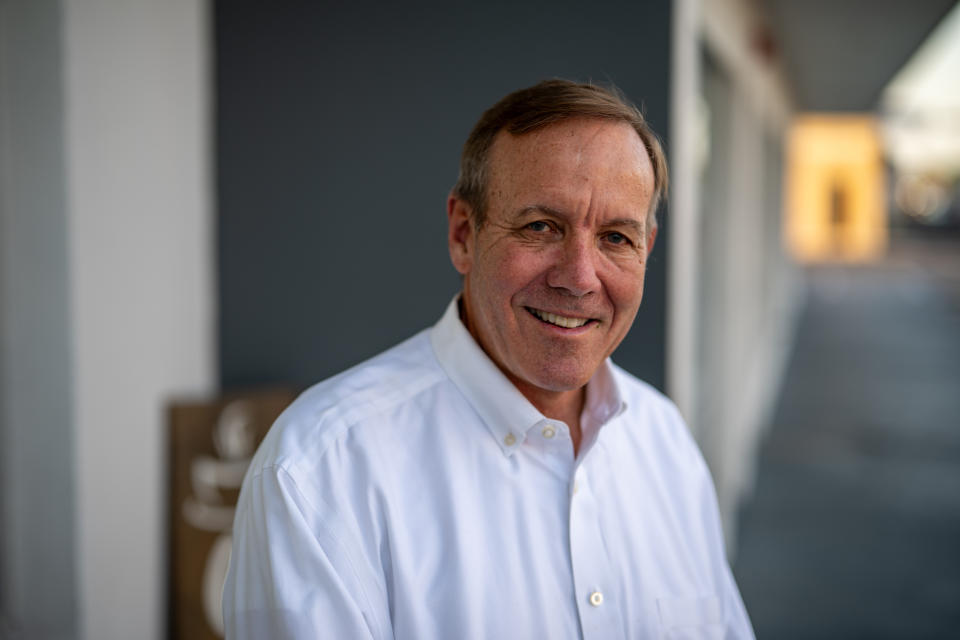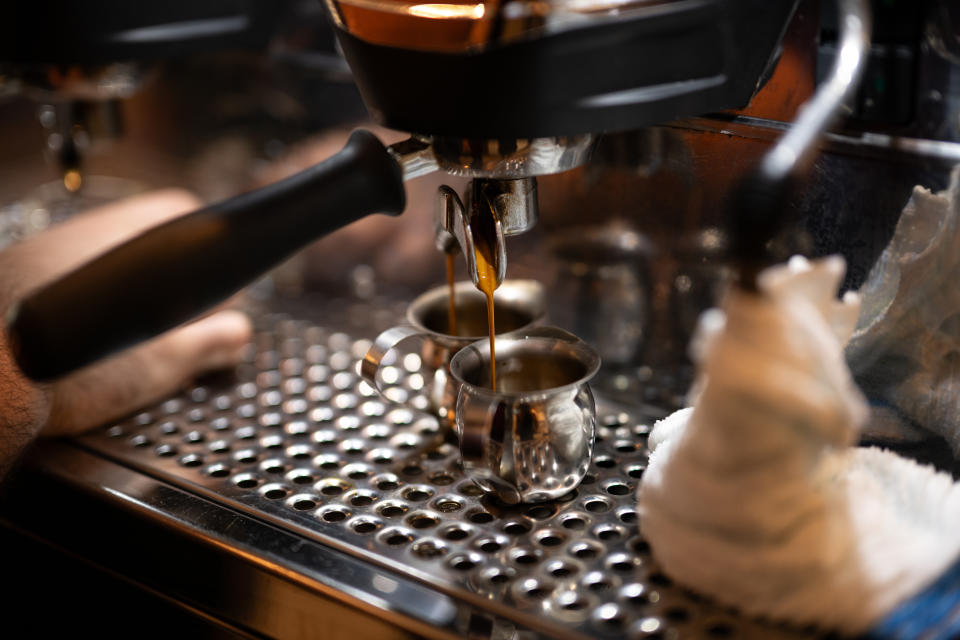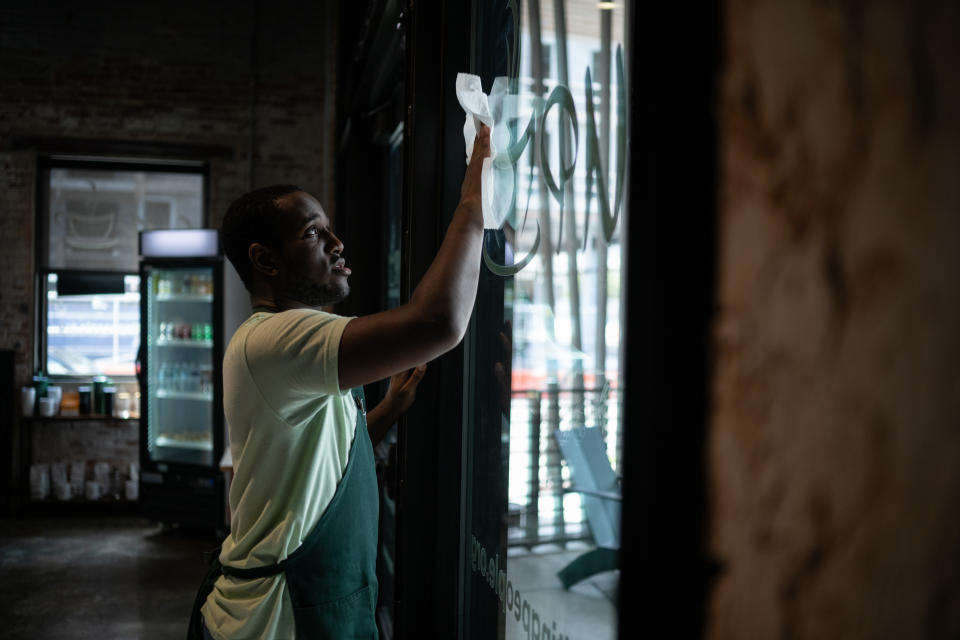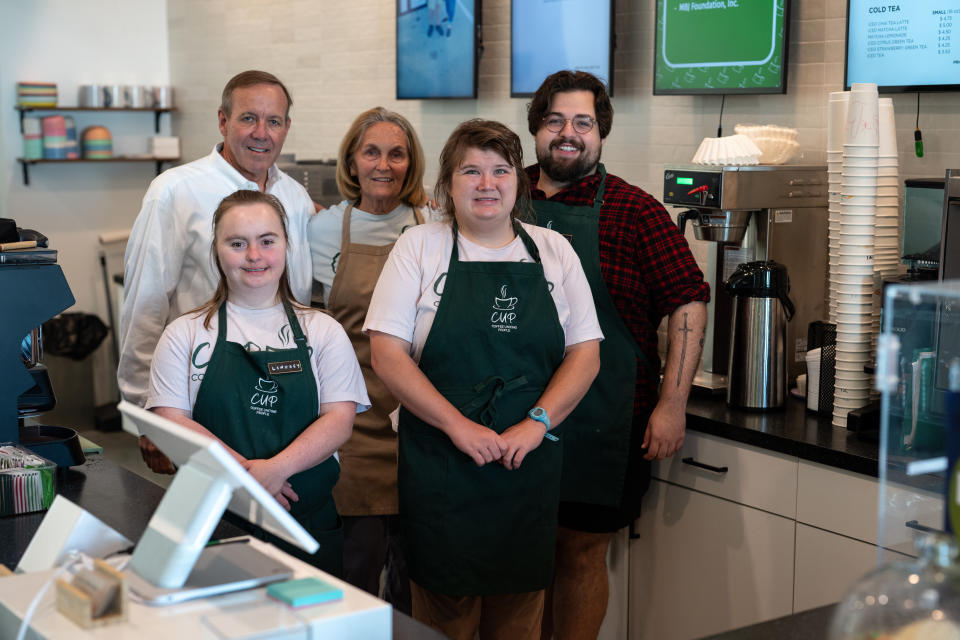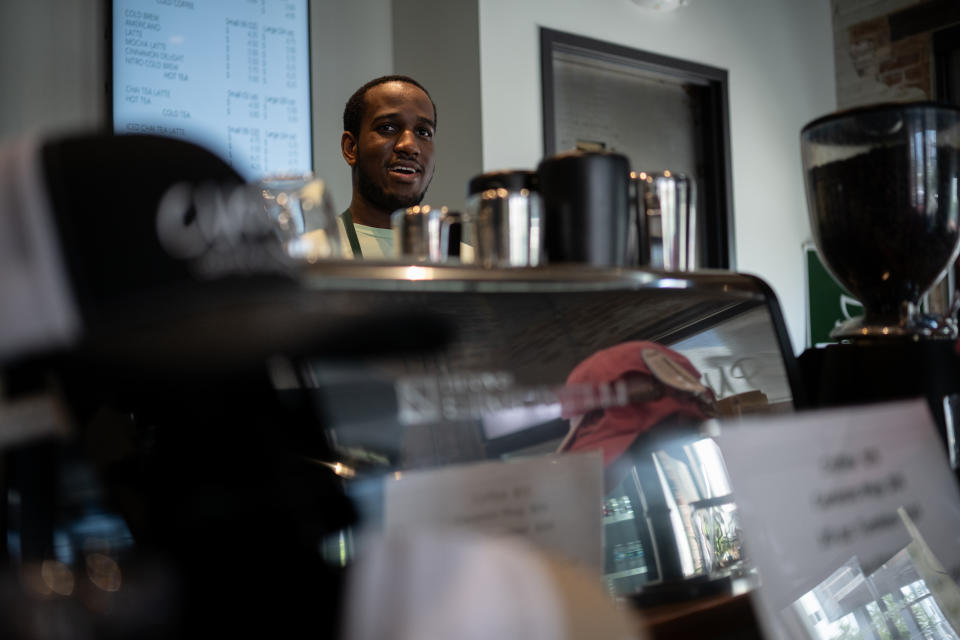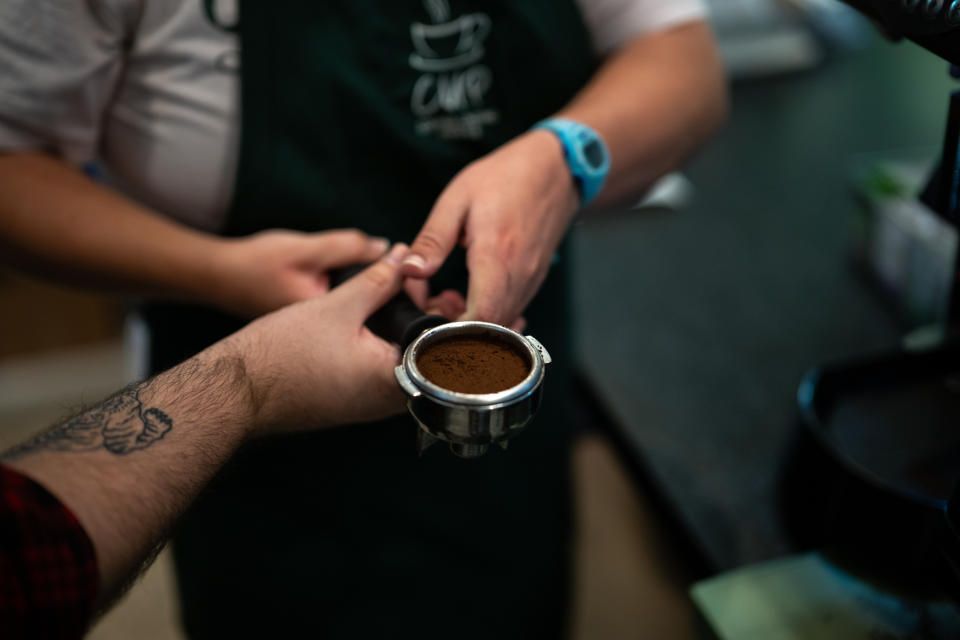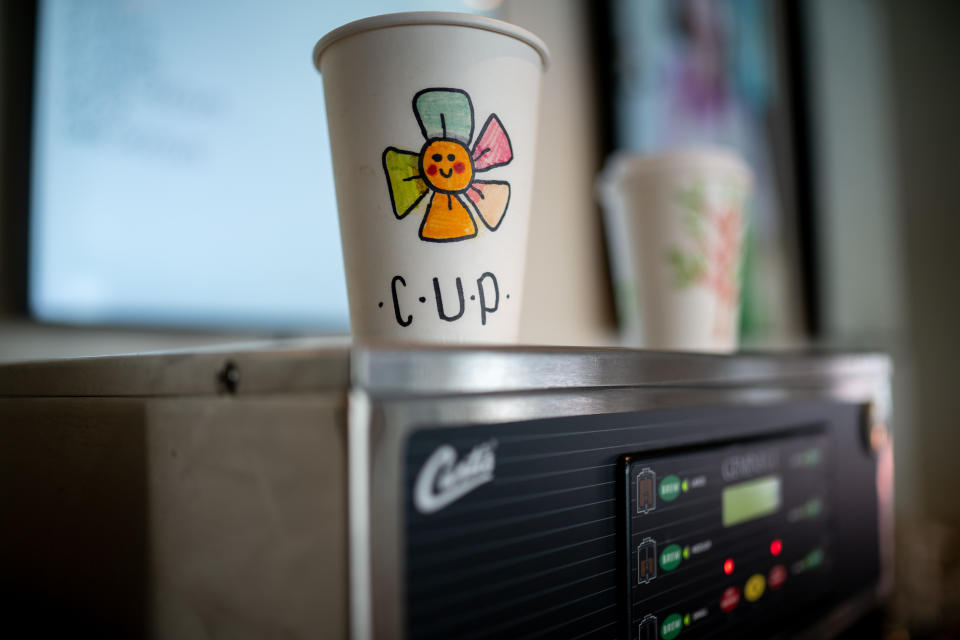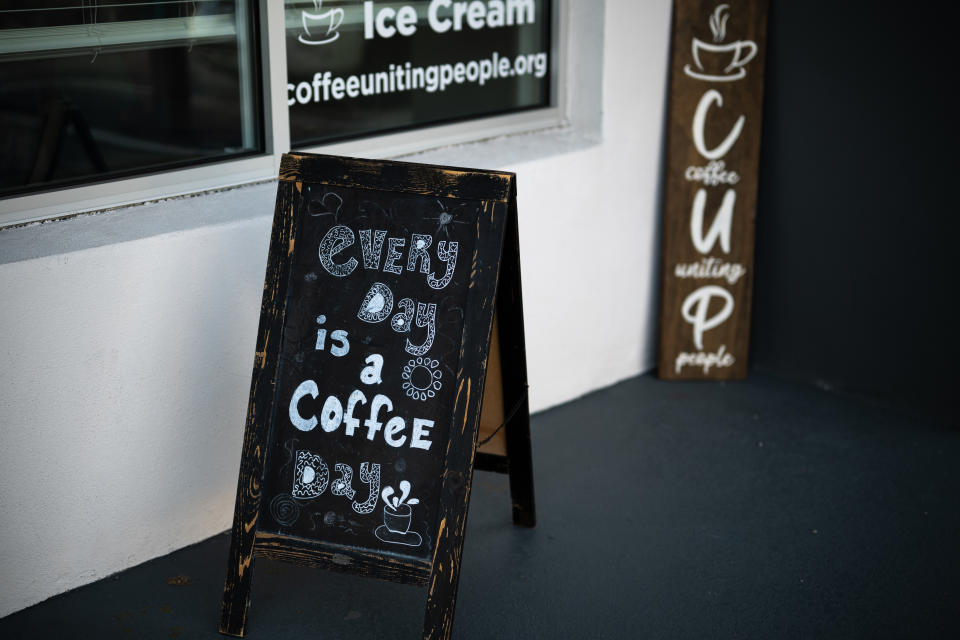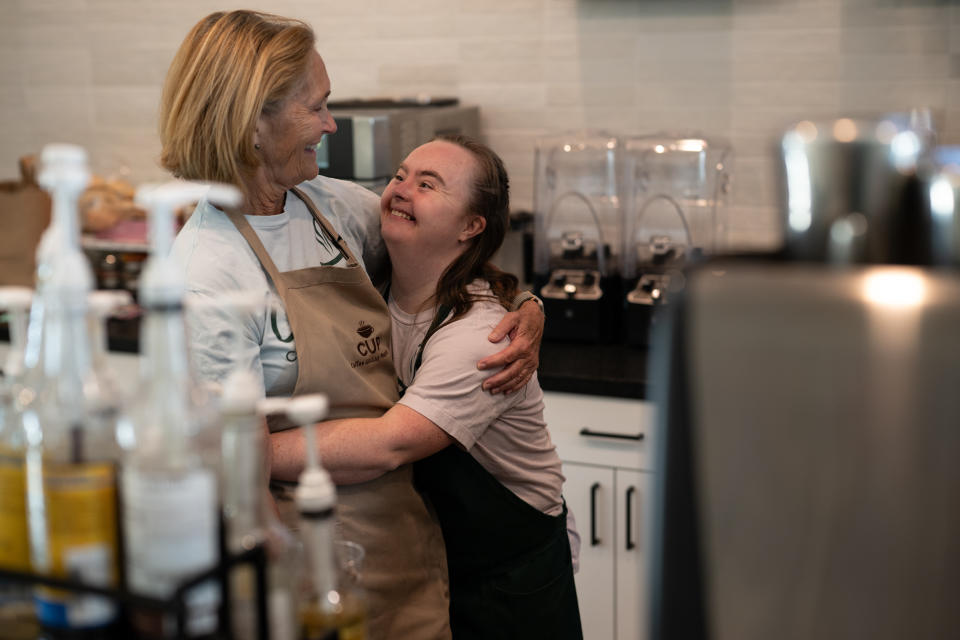At this inclusive coffee shop, the mission is grander than a latte
TAMPA - Danielle Ciaravino leans over the cash register at CUP in South Tampa, deliberately and diligently tapping all the correct keys to correspond with my order of an iced latte.
She considers it for a second and asks me what kind of milk I want. I tell her oat. She taps another key. She asks if I want any flavors, and I tell her hazelnut - don’t judge - and taps again. After another pause, she asks if I want anything else, and I look at the pastry case and ask for an almond cookie, because why not? That generates another tap.
It also cues Ciaravino’s colleague, Carlos Hernandez, to open the pastry case. He grabs a pair of tongs and contemplates the two almond cookies available. He asks another colleague which one looks best, which I take as a sign that Hernandez is looking out for me.
Ciaravino, 27, hands me my latte, then Hernandez, 23, gives me the cookie he matched to me. From order to fulfillment, it took maybe three minutes. If you were just watching this all unfold, it might have appeared a little slow, just because every motion wasn’t as fluid as you might be used to at a typical coffee shop. But this isn’t a typical coffee shop, and that’s something to celebrate.
CUP is an acronym for Coffee Uniting People, and its mission is to employ people with intellectual and developmental disabilities. Some of the challenges the 38 employees face derive from conditions including autism, Down syndrome, cerebral palsy and traumatic brain injury.
The cafe opened in 2023, but the origin story began about 10 years ago, at a Little League Baseball game. Greg Jones, a lawyer who lives in South Tampa, was talking to a friend who said that he needed to take his special needs child to a league almost an hour away because the local leagues didn’t have a division to accommodate him. That didn’t seem right to Jones, who was president of the Palma Ceia Little League at the time, so he helped establish a Challenger program, giving more kids a chance to play. He didn’t have a kid that needed that league; he just felt compelled to help solve a problem that wasn’t his own.
Years later, as he began looking at what he would do beyond his career, he started contemplating the nonprofit sector, enrolled at the University of Florida and earned a master’s degree in family and youth sciences and a certificate in nonprofit leadership.
Then one day he says he was out jogging when he started thinking about what the kids in that baseball program would do when they become adults. Fueled by endorphins and humidity, he germinated an idea to open a coffee shop that employed people with special needs to work alongside neurotypical adults. He wanted to give them an opportunity to be part of the fabric of society. He formed a board from like-minded neighbors and got to work.
The initial plan was to open a coffee shop in his church, Bayshore Baptist, but that got scuttled by zoning issues. So he decided to dream bigger and made a deal for a spot on South Dale Mabry Highway, one of the city’s busiest thoroughfares, for the first cafe. Volunteers and donors helped with the build out, an expensive proposition even at a fraction of the market value of the work.
But a funny thing happened on the way to opening that first cafe in the summer of 2023, and it meant that the first planned one would become the second to open.
A couple miles away in downtown Tampa, the Embarc Collective, a nonprofit organization that provides advice and infrastructure for start-ups, had lost the coffee shop that served its building and was looking for a new tenant for the space. Start-ups, perhaps not surprisingly, are largely powered on caffeine.
When Embarc’s chief executive, Lakshmi Shenoy, heard about CUP, she offered them the space. No build out required. Just come in and start brewing.
For Shenoy, who stops in in the afternoon for a tea, it was an extension of the mission. Embarc is a nonprofit that helps start-ups, and CUP is a nonprofit start-up that just happened to fill a need.
For Jones, it was an acceleration toward the dream of multiple locations. It meant that he could hire twice as many people as he had initially planned. (The cafe has about three dozen employees, and roughly that many more on a waiting list to work there.)
Jones says that CUP is limited only by its own limitations. Which I take to mean he’d like to have just enough cafes to give an opportunity to everyone on the waiting list.
CUP is similar in mission to Bitty & Beau’s, a North Carolina-based chain of 20 shops spread around the country. It describes itself as a human rights movement disguised as a coffee shop and employs about 400 people with special needs. The models are a little different, though: CUP is a nonprofit, meaning any profits legally must be reinvested in the company to benefit the mission. But Bitty & Beau’s success serves to embolden the goals of CUP.
Sitting in either of the CUP cafes is a good way to lift your spirits. The clientele seems to be there to support the mission as much as they are to get a caffeine fix. Some customers aren’t shy about talking about who their favorite employees are and detail progress they’ve witnessed over the months.
Many customers have a personal stake in the cafe. Jane Ramos says this is the only place she goes for coffee anymore, and when a friend wants to meet for coffee, she stipulates that it be at CUP. Her loyalty may largely be driven by the fact that her daughter Emily works here, but when I catch her here, Emily has already left for the day.
I wanted to talk to some of those employees, but I didn’t want to intrude. Turns out, just about everyone was excited to take a break from work to talk about how much they love their jobs.
In the morning at the South Tampa location, Anna Shoop, 24, was a little shy at first. I heard her tell one of her co-workers she was nervous about being interviewed - but then after introducing herself, she surprised me with a hug. She answered my questions with enthusiasm. What’s her favorite job at the cafe? “Serve coffee to everyone!” I asked what she had to learn to do the job. “Cleaning everything!” then she detailed how everything gets cleaned. I asked her favorite people to work with, and she fired off three names, then quickly added who she doesn’t care to work with (but that was off the record).
Later, at the downtown location, I met Cameron Shaw, 23. He politely answered my questions - he enjoys making coffee for others, but doesn’t drink it himself - without expounding on anything. But then I found out that he’s learning to bake, and we suddenly had a lot to talk about, including the apple pie that ended up as a soupy mess, an experience I told him I shared. (Apple pie is harder than it looks, Cameron.)
Then he pulled out his phone to show me a photo of a Kit Kat cake he made that was clearly an unmitigated success. Baking has captured his interest enough that he has interviewed for a job at Mike’s Pies, a local bakery that makes the pies that CUP sells in its cafes.
And that’s an integral part of CUP’s business model. In the food industry, it’s unusual for a business to hope that the employees it invests time and effort in training go out and find jobs elsewhere, but that’s seen as a major victory here. Not just because of the success it signals for that employee, but because it creates a spot for the next person on the waiting list to get their chance.
A day after my visit to CUP, I found myself in a Starbucks near Disney World in Orlando. The place was swamped, and there was a sign on the cash register that said that drinks and food orders would probably take 25 minutes to fill. It took closer to 40, but that’s not really the point.
I took the opportunity to watch the chaos. There were a lot of moving parts, the workers were moving fast - and they weren’t really catching up. I thought about how much care Danielle Ciaravino had shown in taking my order the day before. And how here, it didn’t really appear that anyone was as concerned about making the right choice for me as Carlos Hernandez had been. At CUP, they had managed all that in about three minutes.
Sometimes patience is a matter of perspective.
Related Content
Fentanyl is fueling a record number of youth drug deaths
In a place with a history of hate, an unlikely fight against GOP extremism
Life in Taiwan is rowdy and proud, never mind China’s threats
